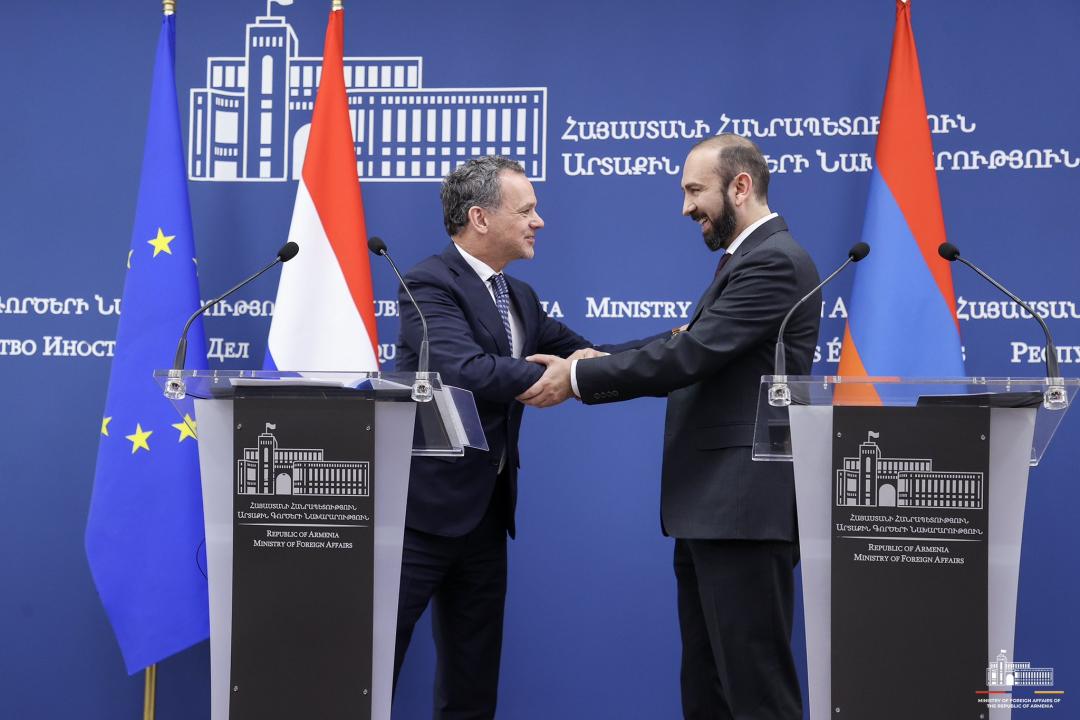
Armenian and Dutch Officials Discuss Armenia’s Foreign Policy, Regional Stability, and EU Relations

On March 12, during a joint press conference with his Dutch counterpart Caspar Veldkamp, Armenian Foreign Minister Ararat Mirzoyan addressed questions regarding the pressure Armenia may face from Russia, emphasizing the interconnectedness of global issues and Armenia’s balanced foreign policy approach.
Mirzoyan was asked about the impact of the war in Ukraine and whether Armenia feels pressure from Russia. He noted that no country in Eurasia is immune to the consequences of the conflict, stressing the importance of global efforts to end the war. While acknowledging that developments in the South Caucasus are influenced by broader geopolitical dynamics, he highlighted opportunities for regional progress independent of the Ukrainian crisis. Mirzoyan reaffirmed Armenia’s readiness to sign a peace treaty with Azerbaijan, recognizing that such an agreement would mark only the beginning of a longer reconciliation process. He also reiterated Armenia’s willingness to normalize relations with Turkey, including establishing diplomatic ties and reopening borders.
Regarding Armenia's relationship with Russia, Mirzoyan emphasized that Armenia follows a balanced foreign policy, deepening ties with the EU and the US while maintaining its partnership with Russia. He underscored Armenia’s civil initiative for EU membership and noted the country’s growing cooperation with neighboring Georgia and Iran. He stressed that Armenia’s foreign policy decisions are guided by national interests rather than an intention to antagonize any country.
Mirzoyan and Veldkamp also discussed the newly signed Declaration on Strategic Cooperation between Armenia and the Netherlands. The agreement covers various areas, including political and economic collaboration, cybersecurity, rule of law, and cultural exchanges. It also promotes peace and stability in the South Caucasus, emphasizing respect for sovereignty, territorial integrity, and the non-use of force. Veldkamp clarified that the document does not involve military cooperation or arms supplies and reassured that it is not directed against any country, including Azerbaijan and Turkey.
In response to questions about Armenian prisoners, Veldkamp confirmed that the EU, including the Netherlands, will continue advocating for their protection in accordance with international standards. He also addressed the ongoing trial of former Nagorno-Karabakh leaders, stressing the need for a fair and transparent legal process. However, when asked about potential sanctions against Azerbaijani President Ilham Aliyev, Veldkamp avoided the topic, instead focusing on the prospects for peace between Armenia, Azerbaijan, and Turkey. He expressed optimism about progress and underscored the importance of normalization for regional and European stability.
Mirzoyan hinted at an upcoming meeting between Armenia and Azerbaijan, where discussions would focus on the peace treaty and related issues, such as the withdrawal of lawsuits from international courts and the potential removal of third-party forces from the border. If agreed upon, these measures would be implemented after the treaty is signed and ratified.
Veldkamp reaffirmed that the Netherlands, as an active EU member, is committed to fostering peace and prosperity in the region. He highlighted Armenia’s dependence on Russia as a key challenge and expressed the Netherlands' readiness to assist in reducing this reliance. Additionally, he warned about the risks of "Russian fakes," which he said could undermine Armenia’s relations with Ukraine and other countries while creating tensions with Azerbaijan.
Meeting with Pashinyan
On March 12, Armenian Prime Minister Nikol Pashinyan met with a Dutch delegation led by Foreign Minister Caspar Veldkamp to discuss strengthening bilateral relations between Armenia and the Netherlands.
Pashinyan welcomed Veldkamp’s visit and praised the dynamic cooperation between the two countries. He expressed appreciation for the strong political dialogue and emphasized the need to expand economic and sectoral ties. He also highlighted the Netherlands’ role in advancing Armenia’s relations with the EU and supporting the country’s democratic reform agenda.
Foreign Minister Veldkamp acknowledged the close cooperation between the two countries’ foreign ministries, built on mutual trust. He noted that the signing of the Declaration on Strategic Partnership would elevate bilateral relations to a new level. Veldkamp further stated that the Netherlands would continue supporting Armenia-EU cooperation, particularly in advancing its reform agenda.
The discussions also covered the Armenia-Azerbaijan peace process and regional stability, with both sides exchanging views on other issues of mutual interest.
See Also


Armenia Records 5.9% GDP Growth in 2024, Missing 7% Goal

Yerevan Balances Strategic Ties with Both US and Russia, Says Foreign Minister

FM Mirzoyan: Peace Deal with Azerbaijan Is Within Reach

Pashinyan and Erdogan Hold Call, Reaffirm Commitment to Ongoing Dialogue

